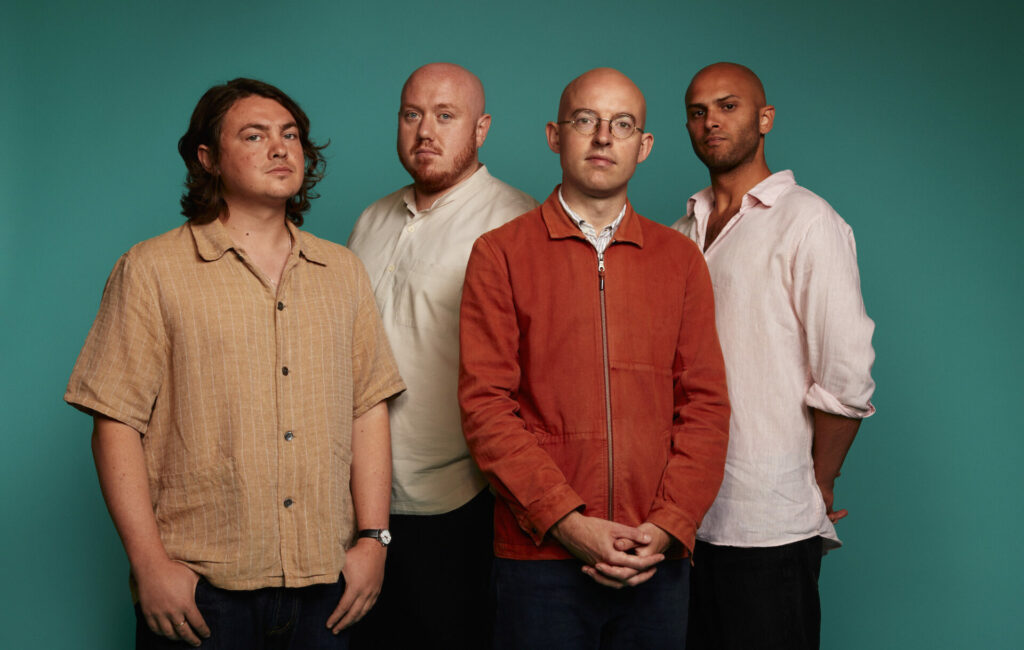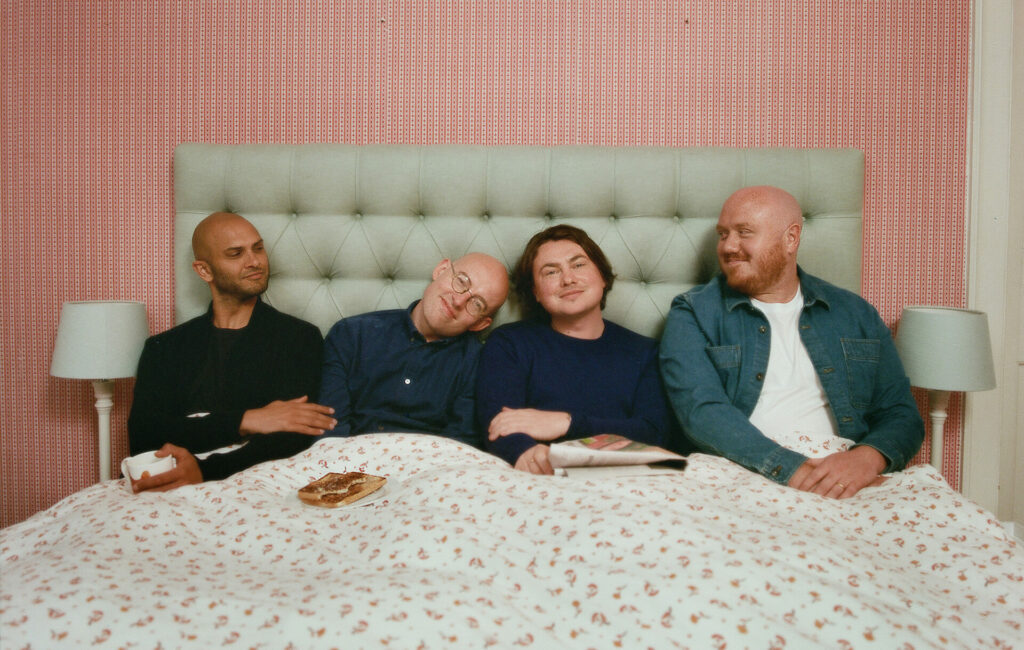My Big Day: Bombay Bicycle Club on their eclectic and star-studded sixth album
As Bombay Bicycle Club gear up to release their sixth album My Big Day, the 00s indie heroes look back on their career, collaborating with Damon Albarn and being a band defined by friendship.
By Nick Reilly

It’s a balmy Tuesday in late July, and Steadman and bandmate Jamie MacColl are sitting in a north London greasy spoon near their rehearsal space. They’re explaining how, for their upcoming sixth album My Big Day, they’ve gone it alone.
“I think the amount of effort and work that we put into this is almost like 10 times the last one, just by the fact that it’s us doing it all,” says Steadman.
Not for the first time, the group have ditched mixing-desk twiddlers from the outside world and delivered a record that is entirely their own creation — and it sounds all the better for it. The added work might be daunting for some artists, but you sense that the deep-lying friendships between these north London lads have no doubt helped them see it through.
More than 20 years after they first met as school friends and shared late-night MSN Messenger sessions about their desire to form a band, Bombay Bicycle Club’s close ties have led to them becoming indie royalty.
There’s a legion of first-time fans whose formative teenage moments were soundtracked by their debut I Had the Blues But I Shook Them Loose, but as Steadman explains, album collaborators such as Holly Humberstone have said they’re proving to be an important voice for Gen Z and beyond too.
“We keep doing this because the band is a tight vehicle, and we’re all pretty open-minded about what the band is. It never has to become boring,” says Steadman.
We’re speaking several months before the album arrives. Is there a heightened sense of anticipation or nerves when you’re sitting on something for a period of time?
Jack: You sometimes have a nervous energy, and you do start to think about whether you should have done things differently. As a songwriter, you can channel that into writing the next record, and I do think that’s why people keep making music.
Jamie: If it was up to me, we’d release it as soon as it’s done! There’s something quite strange about doing a traditional album release. Disclosure released their album recently without a physical part, and there’s something quite liberating about that, but the boring answer is that we wouldn’t want to be a band that doesn’t put out their record physically.
Congratulations on the record, by the way. It’s a lot more laid-back and subtle in places.
Jack: It seems like a combination of all our albums, but the big difference is the amount of people we’ve collaborated with. In this day and age, it’s much more fluid to just ask someone to sing on a song or to deliver a feature, and we found that quite funny.
Damon Albarn, notably, is among those guests.
Jack: Yeah, I’ve known Damon for a really long time. We worked together on the Africa Express project in 2010, and he just kept inviting me back, so we’ve got a good relationship. I recently filled in as creative director for an opera he was doing in Paris. It was a deep and serious opera about France’s dark history in Africa.
That sounds very Damon. I always get the impression that he never stops and is always working on the next musical project, whatever that might be.
Jack: Yeah, we’ll meet him at 9am, and he’ll have already come from another meeting, and his whole day is just filled with the complete opposite to mine. I can barely do one project at a time without feeling overwhelmed. But I respect him for it.
Jamie: His collab was maybe the most challenging to do because Jack did a day of writing with him, but he would be on tour with Gorillaz or making the next Blur record, so he was just writing lyrics in a car between performing at Coachella and then finding a studio to record them in. But he really put the effort in, and we’re very grateful because he’s the kind of guy that could easily move on after a few hours. I think it did mean a lot to him to finish it for us.
There’s even Chaka Khan on ‘Tekken 2’. How the hell do you go about securing Chaka Khan’s involvement?
Jack: Funnily enough that was probably the most straightforward. It was pretty much just like here’s my fee an let’s do it. With a lot of other musicians, there’s a lot more politics, especially if they’re in a current cycle of recording. But that’s testament to the fact she’s been around a while and ,you know, it’s a lot more simpler to do things that way. She was so relaxed about the whole experience, which I loved because I was expecting her to be a massive diva.

What’s the overarching aim of the project and where do you think it takes Bombay’s sound?
Jack: I guess the huge difference and what sets it apart is that we’ve produced it ourselves. When we came back from our hiatus, there was a sense of wanting to ease back into the band by having the help of a producer who could be there to guide us through this.
Jamie: There’s a tendency maybe to rely on producers sometimes and be like, ‘Well, they’re steadying the ship. We don’t need to really focus too much.’ I think the key thing is just having no constraints or boundaries on this. We’re trying to avoid being like ‘Oh, that sounds like a club song or something for Jack’s solo work.’ I think you can definitely hear that on the record because there’s a huge change on it from track to track.
You say you’re probably the best people to produce your own records. Does that come from the fact you’ve been friends for more than 20 years?
Jack: I never really thought about it, but yeah it can’t be worse off for it. I think we also just have a great dynamic that we’ve refined over the last 15 years of me primarily writing the songs, but they’re often these unfinished demos and the rest of the guys have this total clarity to be critical of it.
If a band gets together and writes everything together, there can be a lack of objectivity which can lead, in my opinion, to mediocrity sometimes. Instead, Jamie can just sit at home and get sent something, and he’ll be able to honestly tell me that it isn’t working! I won’t take that personally, and I can just try to tweak it.
Jamie: It only works because Jack has a really thick skin!
That friendship must be a huge part of why you’re still together after 20 years?
Jack: It probably is, yeah, but I think we also keep doing it because the band is a tight vehicle, and we’re all pretty open-minded about what the band is. It never has to become boring.
There’s been a lot of nostalgia recently for mid-00s UK indie, and you were part of it. You’re still pushing forward and evolving though, whereas some bands seem rooted in what they were then.
Jack: We do balance it because we’re not a band that will just play new songs at a gig because we’re not just doing it all for ourselves. We still finish the sets with ‘Always Like This’, but we know we’re there to entertain, and we want to play what people want to hear, even if that means playing a song we’ve played a million times. Even as a punter I don’t want to go to a gig where they just play the new album. I don’t want to see that.
Jamie: We’re not embarrassed by our past, but we’re not constrained by having to service people’s nostalgia. I’ve been thinking about nostalgia a lot recently because for so many of our fans our earlier albums are associated with their lives as teenagers, and that’s a very formative part of your life. I think that was annoying for a while, but actually now I think how great it is that we were able to soundtrack those years for people because musically that’s a really important thing, and we should be positive about it.
You also emerged when Spotify and other streaming services were in their infancy, and there’s been a huge amount of change since then.
Jamie: We were definitely online when we started out, but things have changed so much. It’s funny because Jack recently discovered his old MSN messenger chats between us and it’s just us talking about MySpace and how we can get more fans. I suppose iTunes felt important, but that was more about selling copies of your music.
But as Jack said, streaming does mean that a new generation of fans have been able to discover our music in a way they wouldn’t have done 15 years ago. The equivalent for me would have been going through my dad’s CD rack!
Finally, the record is called My Big Day. How would you spend your ideal 24 hours?
Jamie: I’ve got an 18-month-old son, so I think it’d be just having the house to myself! He’s either really angry or really happy and there’s no in between.
Jack: I’d like to wake up at two in the morning and try and get as far away from London as possible but just on buses. That could be fun.
Any unfulfilled ambitions?
Jamie: My ambition is to get absolutely massive in one random country. I don’t care what size it is or where it is. I’d like to go somewhere and be treated like royalty and then go home and be actually fine with it! Big in Japan maybe — there’s a cliché that never happens.
